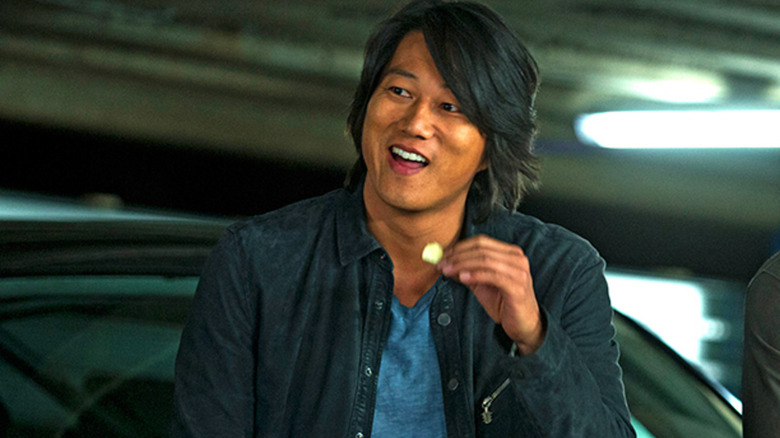Fast & Furious Director Justin Lin Takes Han's Snacking Very Seriously
In a franchise inching towards double-digit entries and with as big of a cast as "Fast & Furious," where it's not a guarantee that everyone in the audience has watched (or remembers) all the previous installments, it's important to give each character a quirk that makes them instantly memorable. People who missed the second movie might not know the name of Tyrese Gibson's smartass, but his constant wisecracks make us care about him anyway on a film-to-film basis, even if he's rarely the main focus of any given scene.
Likewise, those who missed out on "Tokyo Drift" may not understand how Han Lue (Sung Kang) came in, but it's still easy to keep track of him as that guy who's always snacking on something. (He's also the guy fans rooted to bring back.) Not only is it a relatable character trait — who among us would not like to have a snack on hand throughout any given situation? — but it's one that is consistent with his backstory and personality. As a former chain smoker, Han needs to be doing something with his hands to avoid the temptation to relapse. He's also perhaps the most laid-back person in the crew, and nothing says laid-back like someone hanging out in the corner, just eating his chips.
But for director Justin Lin — who first joined the franchise with "Tokyo Drift" and stuck around for the fourth, fifth, sixth, and ninth films — every choice about Han's snacking is made far less casually than you would think.
'We cannot fake Han's snacks'
"It just can't be a regular snack," Justin Lin told Collider in an interview in 2021, ahead of the Blu-ray release of F9. "And talking to Sung, I think they had to go — like, they had to import those crackers, you know? And I was adamant, I was like, 'We cannot fake Han's snacks. It doesn't matter.'" This is why you never see Han eating Cheez-its or M&Ms; he's always munching on something you wouldn't typically find in an American vending machine. For a character who hails from Japan, he's got Japanese snacks like Kameda Seika Kakinotane Rice Crackers or Meiji Hello Panda Cookies. Lin added: "Having worked with Sung, like even the way he tosses it, you know, it had to be natural. So I remember that was a big thing."
While all of this may sound ridiculous, it's part of the authenticity that helps sell the character. While most viewers may not notice, you can expect Japanese audiences to question what's going on. It's a similar kind of attention to detail that inspired William Hartnell, the first Doctor on "Doctor Who," to decide the exact function of every button and lever on the TARDIS control panel and keep it consistent (via "About Time"). Keen-eyed viewers might have picked up on the fact that he was pressing buttons at random, and it would've made the show feel a little less authentic.
As cartoonish and absurd as "Fast & Furious" has gotten over the years — in the latest entry, they ended up in space — the franchise has always seemed to understand that when it comes to the little things that make a character seem real, being authentic and consistent is still crucial.

